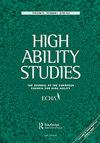资优青少年的社会目的
IF 1.8
4区 教育学
Q2 EDUCATION, SPECIAL
引用次数: 5
摘要
在这项研究中,我们调查了来自韩国和美国的1600多名资优和正常发展(未被认定为资优)中学生的看法,以确定资优青少年的社会目的、对社区的兴趣和参与以及对社会改善的实际承诺的偏好模式。然后,我们研究了他们的社会目的随天赋认同地位和学生文化背景的变化程度。资优学生认为实现目的是他们表达社会目的的首选模式,而典型发展学生则倾向于自我导向的生活目标。有天赋的学生对社会事务也有更强烈的兴趣,并且比没有身份的学生表现出更强的社会和公民参与意识。在资优学生中,韩国学生对亲社会行为表现出更强的信念,并对他们认为对社会重要的事情表现出更大的承诺。相比之下,美国的青少年则是按照他们所表达的价值观行事。感知的社会目的和对社区和社会的承诺都能预测学生的生活满意度,而不考虑文化归属。讨论的重点是天才学生和普通学生之间亲社会意向和参与程度的差异,以及个人和社会价值观的差异,这可能有助于解释我们在两个不同国家的天才学生之间观察到的社会目的的差异。本文章由计算机程序翻译,如有差异,请以英文原文为准。
Academically gifted adolescents’ social purpose
ABSTRACT In this study, we examined the perceptions of over 1,600 gifted and typically developing (not identified as gifted) secondary students from South Korea and the USA to identify gifted adolescents’ preferred modes of social purpose, interest in and engagement with their communities, and actual commitment to societal improvement. We then examined the extent to which their social purpose varied with gifted identification status and students’ cultural background. Gifted students identified actualized purpose as their preferred mode of expressing social purpose, while typically developing students favored self-oriented life goals. The gifted students also had a stronger interest in social matters and showed a greater awareness of social and civic engagement than the nonidentified students did. Among the gifted students, Korean students expressed a stronger belief in prosocial behaviors and reported a greater commitment to what they believed important for society. In contrast, the American adolescents behaved in accordance with their expressed values. Both perceived social purpose and commitment to their communities and society predicted students’ life satisfaction regardless of cultural affiliation. Discussion focuses on differences in the degree of prosocial intention and engagement between the gifted and typical students, and personal and societal values that may help explain the differences we observed in social purpose among the gifted students from the two different nations.
求助全文
通过发布文献求助,成功后即可免费获取论文全文。
去求助
来源期刊

High Ability Studies
Multiple-
CiteScore
4.80
自引率
11.10%
发文量
7
期刊介绍:
High Ability Studies provides a forum for scholars in a variety of disciplines associated with the development of human abilities to their highest level. It is a medium for the promotion of high ability, whether through the communication of scientific research, theory, or the exchange of practical experience and ideas. The contents of this journal are unique in reflecting concerns and recent developments in this area from childhood and across the whole life span in a variety of contexts. Far from being restricted to the traditional focus on high-level cognitive development, it also presents investigations into all other areas of human endeavour, including sport, technology, the arts, business, management and social relations.
 求助内容:
求助内容: 应助结果提醒方式:
应助结果提醒方式:


